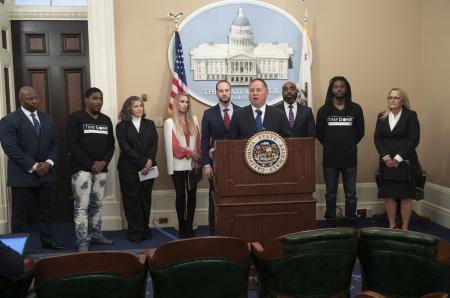
AB 2978 Automates Record Clearance For Those Already Qualified For Relief Under Current Law
SACRAMENTO, Calif. – Expanding the reach of landmark criminal justice reform successfully championed last year, Assemblymember Phil Ting (D-San Francisco) unveiled AB 2978 today, providing broad post-conviction relief to people who have fully completed the terms of their sentence and rehabilitation.
AB 2978, sponsored by Californians for Safety and Justice and supported by district attorneys across party lines, would allow individuals with an eligible conviction dating back to 1973 to have their record automatically cleared when a person has fully completed the terms of their sentence. This proposal builds upon AB 1076, which Ting authored and was signed into law by Gov. Gavin Newsom in 2019; automatic records clearance, however, applies only to new cases beginning next year and beyond. AB 2978 seeks retroactivity.
“For me this is about fairness,” said Ting. “While I’m grateful my law from last year will help those arrested after Jan. 1, 2021, millions of Californians today are still living in a paper prison. Their records prevent them from getting jobs or housing. Let’s give people with past convictions the same clean slate that individuals in the future will be entitled to. Everybody deserves a second chance.”
Under current law, people can only have old convictions on their records cleared by petitioning courts through an arduous and often costly process. It can require hiring a lawyer to help identify records and file the necessary paperwork. Many are discouraged from doing it. According to a report by the Alliance for Safety and Justice, automatically clearing an old conviction after a person has completed their sentence is key to regaining family stability and economic security, which, in turn, is an integral part of a comprehensive public safety strategy.
In California alone, eight million people are living with a past conviction or record that can lead them to face thousands of legal restrictions to jobs, housing, and other opportunities. That number grows to over 70 million when considering the entire country. Nationally, it is estimated that the United States loses over $87 billion in gross domestic product every year because of employment losses among people with a past conviction.
“Millions of Californians who have completed their sentence, paid their debt, and remained crime-free for years still have old, stale convictions on their record,” said Jay Jordan, executive director of Californians for Safety and Justice. ‘This leads to thousands of legal restrictions that block people from employment, housing, education, and other critical opportunities. These restrictions undermine public safety and the economic viability of communities across California. We must mean what we say when we call someone rehabilitated and stop denying their ability to earn stability and move forward in their lives.”
AB 2978 is expected to have its first committee hearing this Spring. Pennsylvania and Utah have both recently enacted automated records clearance legislation, while similar legislation is being considered in Michigan.
# # # #